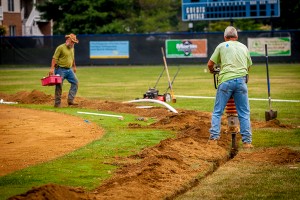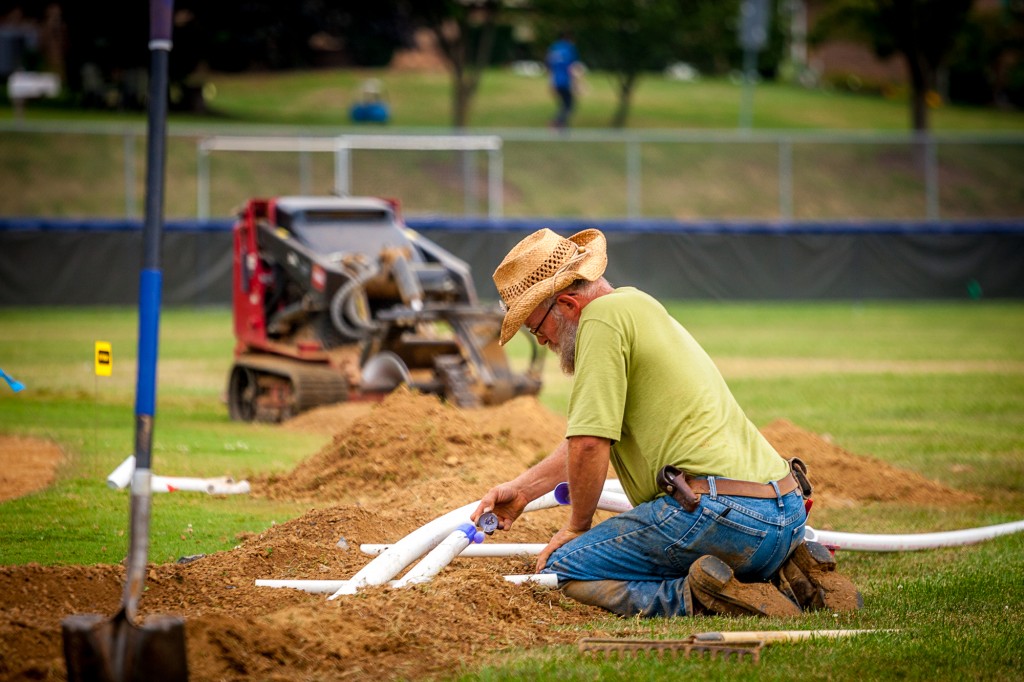This fall, the Eastern Mennonite University baseball field should be a little greener — and in more than one sense of the word. A new irrigation system uses sustainable technology to grow and support higher quality playing surfaces.
Weaver Irrigation is currently installing a system that will use non-potable storm water collected by a nearby cistern to evenly and efficiently water the infield and outfield, according to athletic director David King.
The upgrades, which cost approximately $22,000, will save both time and water, said head coach Ben Spotts. Previously, just the infield and dirt basepaths were watered by one sprinkler head, while manually deployed garden hoses and sprinklers were used for the rest of the field, resulting in uneven growth and surfaces.
These methods provided less control over how the field is watered and maintained. The current system enables more efficient use of water during the early morning or late evening when less evaporation occurs.
More improvements planned

Spotts expects the outfield to benefit from the irrigation system, which will support continued overseeding and fertilization to improve quality of the soil. Additionally, the Bermuda grass that was added to the infield last year can now also be propagated and maintained in the outfield.
The irrigation improvements are the first step in a larger renovation project of EMU’s baseball facilities, to include new dugouts, backstop, press box, hitting pavilion, and additional seating behind home plate.
The start date for this project hasn’t been announced yet, but King says that the baseball program’s recent growth and improvement has been among several recent highlights of the EMU athletic program. In 2014, in just his second year at the head of the program, Spotts led the Royals to the third 20-win season in program history.
“While we know recruits are drawn to Coach Spotts and the program he is developing, we think the upgrades to our current baseball facility will help us attract more top players,” said King.
Sustainable practices link to cistern project
The “greening” of the baseball field fits another EMU commitment—to that of sustainable practices, said Eldon Kurtz, director of the physical plant.
Kurtz acknowledges that use of water for irrigation of recreational fields during a time of growing water shortages across the country may be questioned by some.
“In my view, sustainability is often a matter of balancing competing priorities and managing maintenance best practices as knowledge and technology change,” he added.
In this case, Kurtz points to the need for healthy turf to keep athletes safe and to support the athletic programs, while at the same time “increasing the acreage managed as meadows, use of artificial turf and storm water for irrigation, and turf management practices that limits use of chemicals and how short the grass is cut.”
The 100,000-gallon cistern, built next to the physical plant in 2012, irrigates approximately 6.5 acres, including the south soccer fields, softball fields and Bomberger Field. It collects runoff from 15 acres of campus and helps return water to the water table through irrigation. The year it was built, the cistern project won an award for best green campus projects from the National Wildlife Federation.
When the cistern is dry, irrigation is supplied by the city of Harrisonburg. Additional improvements may extend the irrigation system to the front of campus as well as add a well to provide water during prolonged dry periods.
